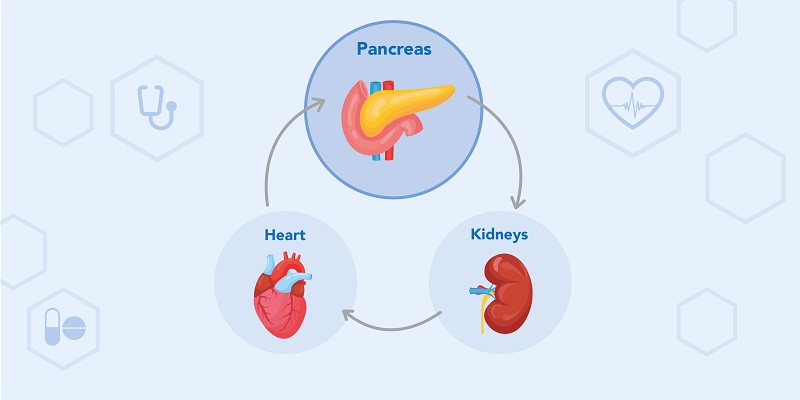Heart failure and the Cardiovascular, Renal, Metabolism (CVRM)
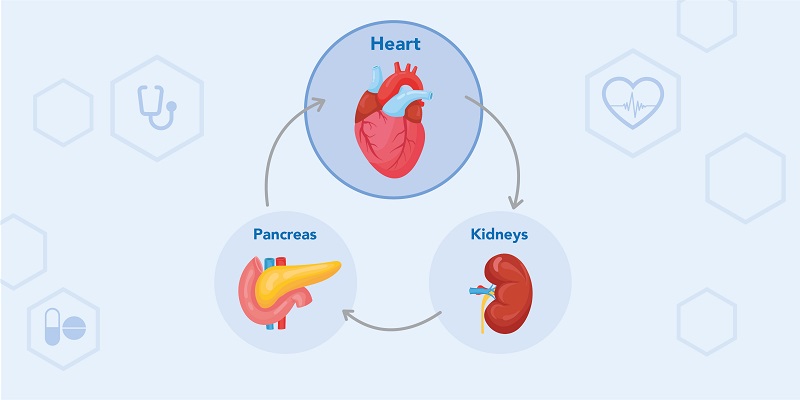
Heart failure, characterised by the heart’s inability to adequately support the body, is a critical condition. However, with proper management, individuals can lead fulfilling lives. This ailment is closely associated with other cardiovascular disorders, kidney disease and diabetes, collectively termed as the “CVRM” disease cluster. Discover the connections between these diseases and the optimal strategies to address them for improved overall health.
What is CVRM?
Each organ of the body performs a specific task, but also depends on the other organs to function well. When one part isn’t working properly, it places stress on the others, negatively affecting your health as a whole.
An important example of this interconnection is how the heart, kidneys and pancreas affect one another, and the corresponding links between cardiovascular disease, chronic kidney disease and Type 2 diabetes.
These organ systems can be collectively termed “CVRM”:
CV: Cardiovascular – refers to the circulatory system – the heart and blood vessels.
R: Renal – refers to the kidneys, which can develop chronic kidney disease (CKD). With CKD, the kidneys can’t properly perform their function of removing waste and toxins from the blood.
M: Metabolism – refers to the pancreas, which produces enzymes and hormones, notably insulin, that help break down food and control blood sugar levels. Type 2 diabetes is the most common associated condition. 1,2,3
What is heart failure?
Heart failure is when the heart is not able to pump oxygen-rich blood around the body well enough to meet the needs of all the organs. This usually occurs because the heart muscle has become weak or stiff, and is unable to properly fill with blood. Blood can accumulate, resulting in fluid retention in the lungs, which may manifest as difficulty in breathing.
Heart failure is a serious condition, but it does not mean that the heart has stopped beating.4,5,6
Heart failure can be acute (onset is sudden and severe, requiring emergency care) or chronic (where the development is much slower and endures for a long time).
Heart failure tends to gradually worsen over time. However, symptoms can often be controlled for many years.
There are three main types of chronic heart failure, depending on the amount of blood pumped at each heartbeat from the left ventricle, the chamber of the heart from where blood travels to the body. This amount is called the ejection fraction:
- Heart Failure with reduced Ejection Fraction (HFrEF)
- Heart Failure with mildly reduced Ejection Fraction (HFmrEF)
- Heart Failure with preserved Ejection Fraction (HFpEF) 5,7

The three main types of chronic heart failure7
Changes associated with each type of chronic heart failure7

Causes and risk factors
- Coronary artery (heart) disease – arteries supplying blood to the heart itself are narrowed or blocked
- Hypertension (high blood pressure) – puts extra strain on the heart
- Cardiomyopathy – conditions affecting the heart muscle.
- Arrhythmia – heart rhythm problems, such as atrial fibrillation
- The heart valves, which control blood flow between the chambers, are damaged or dysfunctional.
- Congenital heart disease – birth defects affecting normal heart function.
- Diabetes
Obesity, anaemia (insufficient red blood cells), excessive alcohol intake, overactive thyroid, pulmonary hypertension (high blood pressure in the lungs), smoking, unhealthy diet and a sedentary lifestyle are also risk factors.
Heart failure becomes more common with age, affecting around 1 in 7 people over age 85.5,8
Symptoms
Common symptoms of heart failure may include:
- Breathlessness, which may be worse when lying down
- Swelling (oedema) in feet, legs or stomach
- Fatigue
- Dizziness or fainting.
Less common symptoms: persistent cough or wheeze; rapid heart rate, weight changes; rapid or fluttering heart beat; confusion.
Get emergency medical assistance if symptoms are sudden or severe. South Africa emergency numbers: 10177; 112 (cell phone).
Tell your doctor if you experience ongoing or gradually worsening symptoms.5

Diagnosis
Early diagnosis and treatment improve the outlook for a better quality and length of life.
Diagnostic tests may include:
- Blood tests – indicate whether symptoms are caused by heart failure or another condition
- Breathing test – shows if a lung condition is contributing to symptoms e.g. breathlessness
- ECG (electrocardiogram) test – measures the heart’s electrical activity
- Echocardiogram – uses ultrasound to view the heart.8
These tests will help identify the type of heart failure you have (HFrEF, HFmrEF or HFpEF) and inform appropriate treatment.7,8
Treatment
Treatment depends on underlying causes, but generally aims to control symptoms, slow progression of heart failure and improve your quality of life. Treatments may include:
- Medication e.g. Angiotensin inhibitors to relax the blood vessels and reduce strain on the heart, Beta-blockers to slow the heart so it doesn’t need to work as hard, Mineralocorticoid receptor antagonists – regulate fluid and sodium levels, reducing scarring of heart muscle, Sodium-glucose co-transporter-2 (SGLT2) inhibitors – help remove fluid and sodium, protecting heart and kidneys. Diuretics – also reduce excess fluid and sodium and reduce pressure in the heart.
- Surgery e.g. angioplasty, coronary artery bypass, heart valve repair; heart transplant.
- Implanted devices such as pacemakers and defibrillators to help control heart rhythm.
- Healthy lifestyle changes.7,9
Links between heart failure and kidney disease
Cardiovascular disease – including heart failure – and kidney damage are closely related. With heart failure, the kidneys often don’t work properly, which in turn increases stress on the heart.
The kidneys remove waste and excess water from the blood, which the heart pumps throughout the body, including back to the kidneys. When the kidneys aren’t working well, composition and volume of the blood changes, making the heart work harder to move it around the body, and putting stress on the blood vessels (hypertension). In turn, increased pressure on blood vessels can damage the kidneys, limiting their blood-filtering ability.
Around one in three people with heart failure has chronic kidney disease.10
Take charge of your health
Taking your doctor’s advice about treatment and lifestyle seriously will help manage heart failure symptoms, slow the disease’s progression, and improve everyday quality of life. Take it one step at a time:
- Take medications exactly as prescribed. Don’t take any other drugs or remedies without first asking your doctor.
- Check in regularly with your doctor for monitoring and advice.
- Follow a healthy diet rich in fruits and vegetables, whole grains, low-fat dairy, poultry, fish, nuts and legumes. Avoid saturated and trans fats cholesterol, red meat, sugar and sodium (salt). Sodium causes fluid retention, which can lead to hypertension, oedema and breathing difficulties. Swap salt for herbs, citrus and salt-free seasoning.
- Maintain a healthy weight. Sudden weight gain or loss may mean heart failure is progressing: tell your doctor if this occurs.
- Watch fluid intake. With heart failure, the body tends to retain fluid. Your doctor may recommend limiting daily fluid intake.
- Stop smoking. Each puff of nicotine temporarily raises heart rate and blood pressure, and lowers oxygen content of blood reaching the cells.
- Avoid alcohol. Excessive amounts increase risk for various health problems, including hypertension.
- Get regular exercise for multiple health benefits, including lowering cholesterol and blood pressure, and weight management. Your doctor will help you plan a safe exercise routine. If moderate exercise isn’t possible for you, consider participating in a rehabilitation programme.
- Get enough Blood pressure drops during sleep, giving your cardiovascular system a rest.
- Protect your mental health. Living with heart failure can be challenging, and you may sometimes feel depressed or anxious. Find a therapist, talk to friends and family, and try meditation or other activities you find calming. Remember you’re not alone: around 70 million people worldwide are living with heart failure, so reach out to others on a similar journey. Consider joining a patient support organisation near you or online. For information contact: Heart and Stroke Foundation https://www.heartfoundation.co.za/ or the Heart Failure Society of South Africa (HeFSSA) https://www.hefssa.org/ 8
Related Brochures
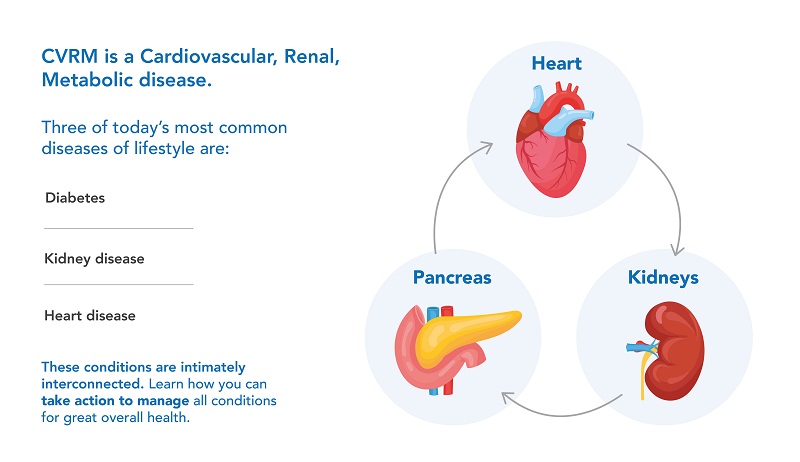
cardiovascular-disease-and-cvrm
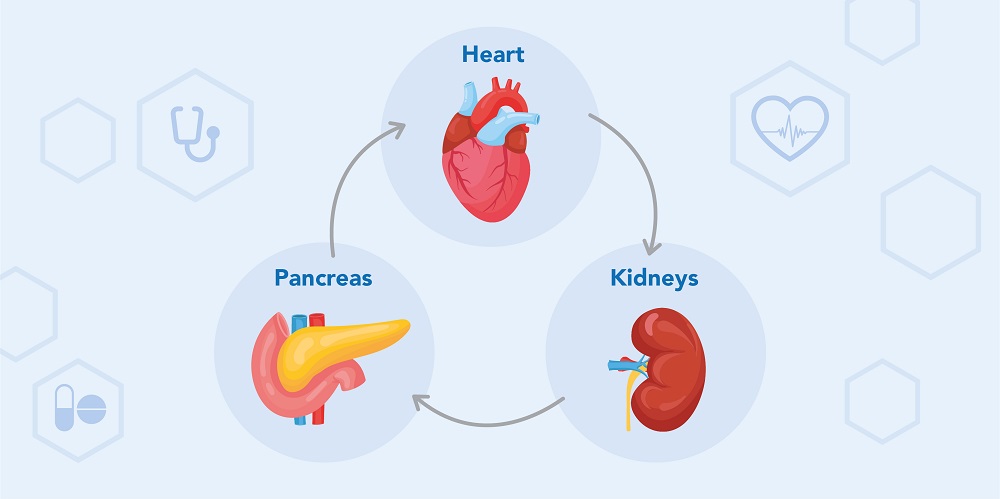
what-is-cvrm
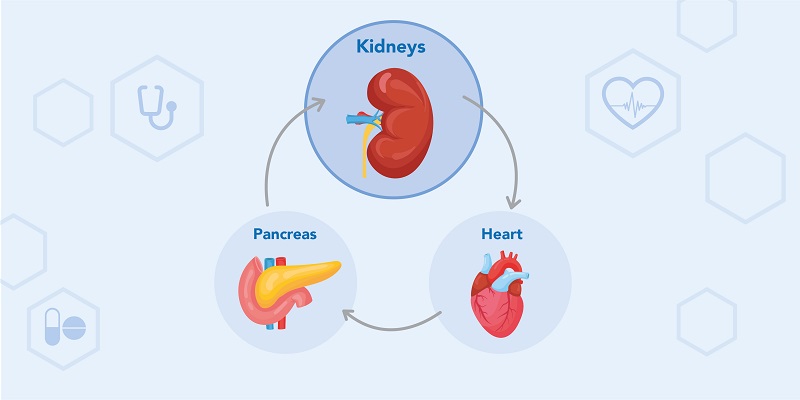
chronic-kidney-disease-and-cvrm
